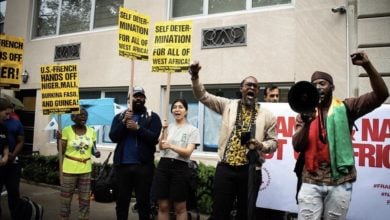Increased U.S. military incursions into Pakistan have sharply raised tensions in the region. Pakistani troops engaged in combat with U.S. forces on Sept. 25, shooting at a U.S. helicopter.
|
The U.S.-led military operations crossing from Afghanistan into Pakistan have sparked indignation among Pakistani people. Mass outrage reached a new high following a Sept. 3 raid that took the lives of 20 civilians. On Oct. 3, in the latest of a series of bombings, two U.S. missiles hit villages in North Waziristan, killing at least another 20 people.
These overt violations of Pakistan’s sovereignty have forced the administration of Pakistan’s new president, Asif Ali Zardari, to register strong protests. In order to quell popular discontent, the Pakistani government has declared that it would not stand for incursions, and would defend its sovereignty.
Afghan resistance forces fighting the U.S. occupation have established bases in portions of the Pakistani autonomous regions along the border with Afghanistan. Afghan fighters have deep cultural and religious ties with peoples along the border, and traditionally have the backing of sections of the Pakistani military and intelligence establishments.
Pakistani governments—civilian and military alike—have been reliable U.S. clients. However, the present government has come under growing U.S. pressure to take more decisive action against these militant forces. The media often refers to them as the “Taliban,” but, in reality, these forces are a mix of the Taliban and other Islamic militant groups that have grown in size due to resentment toward imperialist aggression.
Though Pakistani military forces have periodically clashed with militants near the border, the government has been reluctant to launch a full-scale war in the tribal regions despite persistent U.S. exigencies. Pakistan’s already horrendous social conditions are the most precarious in those areas, which also have little central government presence.
The governmental vacuum in the tribal regions has allowed militant groups to carve out a zone where they can freely organize their forces and take on some of the traditional roles of the state. Their cooperation with the CIA and Pakistan’s Inter-Services Intelligence has allowed them to develop a fairly sophisticated military infrastructure.
Pakistani governments have preferred to fight militants to a standstill and then cut deals to salvage peace. The new Zardari administration has promised to bring economic development to those regions in hopes of undercutting militant groups.
Washington, however, has grown more restive over the issue. It insists those militant groups are operating within Afghanistan against occupation forces, and demands forceful military action from the Pakistani government at any cost.
Pakistan’s government now seems to be caving to Washington’s pressure and launching an extensive military operation in the mountainous border regions. On Oct. 3, Minister of Interior Rehman Malik stated in an interview: “We will not stop any operation unless we reach its logical conclusion. That means that this war will continue until we make Pakistan terrorism-free.”
Pakistani President Asif Ali Zardari has publicly continued to act as a friend of the United States, and clearly hopes his new military offensive on Bajaur will convince the Americans that they do not need to continue with cross border attacks.
This tightrope will become increasingly harder for Zardari to walk. To preserve the stability of his government, he must bring peace and improve conditions in the most afflicted regions of the country. That need cannot be easily reconciled with fighting an internal war that can be extremely bloody, as the Sept. 20 Marriott hotel bombing in Islamabad demonstrated.
Being wedged between this rock and the hard place of continued U.S. strikes leaves the Zardari government in a fragile position. The Zardari government has to strike a balance between the wishes of Washington and the strong sentiments of the masses.
The explosive political events and continuing social crisis mean that major upheavals may still be in the cards for Pakistan. Progressives in the United States should stand with the people of Pakistan in their struggle for better living conditions and in opposition to U.S. military aggression.






